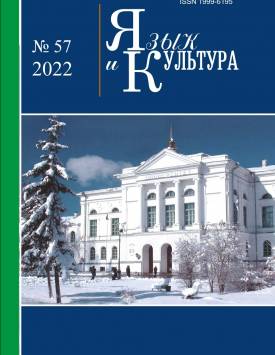The first Russian translation from Petronius (M.N. Muravyov «Civil war»)
Using the example of passage (1-13), the article reveals the peculiarity of the poetics of M.N. Muravyov's translation of Petronius' epic poem “On the Civil War”, which is part of the novel “Satyricon”. The translation was made by M.N. Muravyov in 1773 and was published in a separate edition in 1774 under the title “Petronia Arbitra Civil War”. It was the first translation in Russia of the largest of the surviving poetic parts - bellum civile. The article also identifies the importance of ancient culture for M.N. Muravyov, analyzes the semantic, stylistic, rhythmic-metric parameters of M.N. Muravyov's translation of an excerpt from Petronius' poem “On the Civil War”. The article uses philological methods of interpretation of the text with the involvement of historical-philosophical, literary-aesthetic contexts and using the methodology of comparative analysis. Gaius Petronius Arbiter, a Roman writer and poet of Nero's time, is the author of a very popular novel both in antiquity and in Modern times called “Saturae” (per. “Satires”, from the gr. “Satyricon”). The only large novel (presumably from 20 books) has only partially survived: 14, 15 and 16 books. The surviving parts of the novel suggested that it was an original combination of several genres of ancient literature: first of all, a Greek love novel (a parody of a love couple, numerous adventures), a Menippov satire with alternating prose and poetry, a novella, an anecdote, etc. M.N. Muravyov (1757-1807), brought up on ancient samples in childhood, received an excellent gymnasium and university education, studied the ancient heritage from primary sources all his life. Being an expert in all genres of ancient literature, M.N. Muravyov still gives preference to the epic, which, in his opinion, is the highest of the arts. Therefore, it is the literary priorities of M.N. Muravyov that can explain his appeal to the text of Petronius, which is read by Eumolpus as an example of an epic poem about the civil war. M.N. Muravyov preserved all the key images of the beginning of the poem of the ancient author: first it tells about the unlimited power of Rome, then describes the insatiability of the Romans, their desire to seize even more wealth, which leads to satiety of people who enjoy the benefits of the whole earth (in the end, the riches of the East, mined for Rome, are described). The translation by M.N. Muravyov demonstrates a careful attitude to the original source: all semantic accents are placed, artistic means are also close to the original. The lexical and artistic differences between the translation and the original source may be due to the desire of M.N. Muravyev to place his accents, develop and complement the images of Petronius. In the translation of the very young M.N. Muravyov, the intertwining of the traditions of classicism and new trends of sentimentalism is already noticeable: the form, theme, genre, and vocabulary largely meet the tasks of classicism, but M.N. Muravyov, with his emotionality, appreciation, and appeal to the feelings of readers, goes beyond the confines of classicism, which apparently meets the inner needs and artistic priorities of a young poet, already at the beginning of his creative path inclined to sentimentalism. The rhythm of the Greek hexameter is also successfully conveyed by the Alexandrian verse, in addition, the majesty and solemnity of the translation are given by actively used lexical and grammatical Old Slavonic, which gives a tonality similar to Petronius' poem. Since M.N. Muravyov translated Petronius' poem “On the Civil War” in full, it seems promising to further work on the analysis of the uniqueness of this translation, the value of which lies not only in the fact that it was the first in Russia, but also in the fact that M.N. Muravyov's translation activity reflected the patterns of artistic development of Russian literature of the late XVIII - early XIX centuries in its transition from classicism to sentimentalism.
Keywords
the ancient novel, Petronius, M.N. Muravyov, translation, classicism, sentimentalismAuthors
| Name | Organization | |
| Leushina Lilia T. | National Research Tomsk State University | leushina@vtomske.ru |
| Prokopieva Lilliana B. | National Research Tomsk State University | lilianaprokopeva@sibmail.com |
References

The first Russian translation from Petronius (M.N. Muravyov «Civil war») | Yazyk i Kultura – Language and Culture. 2022. № 57. DOI: 10.17223/19996195/57/5
